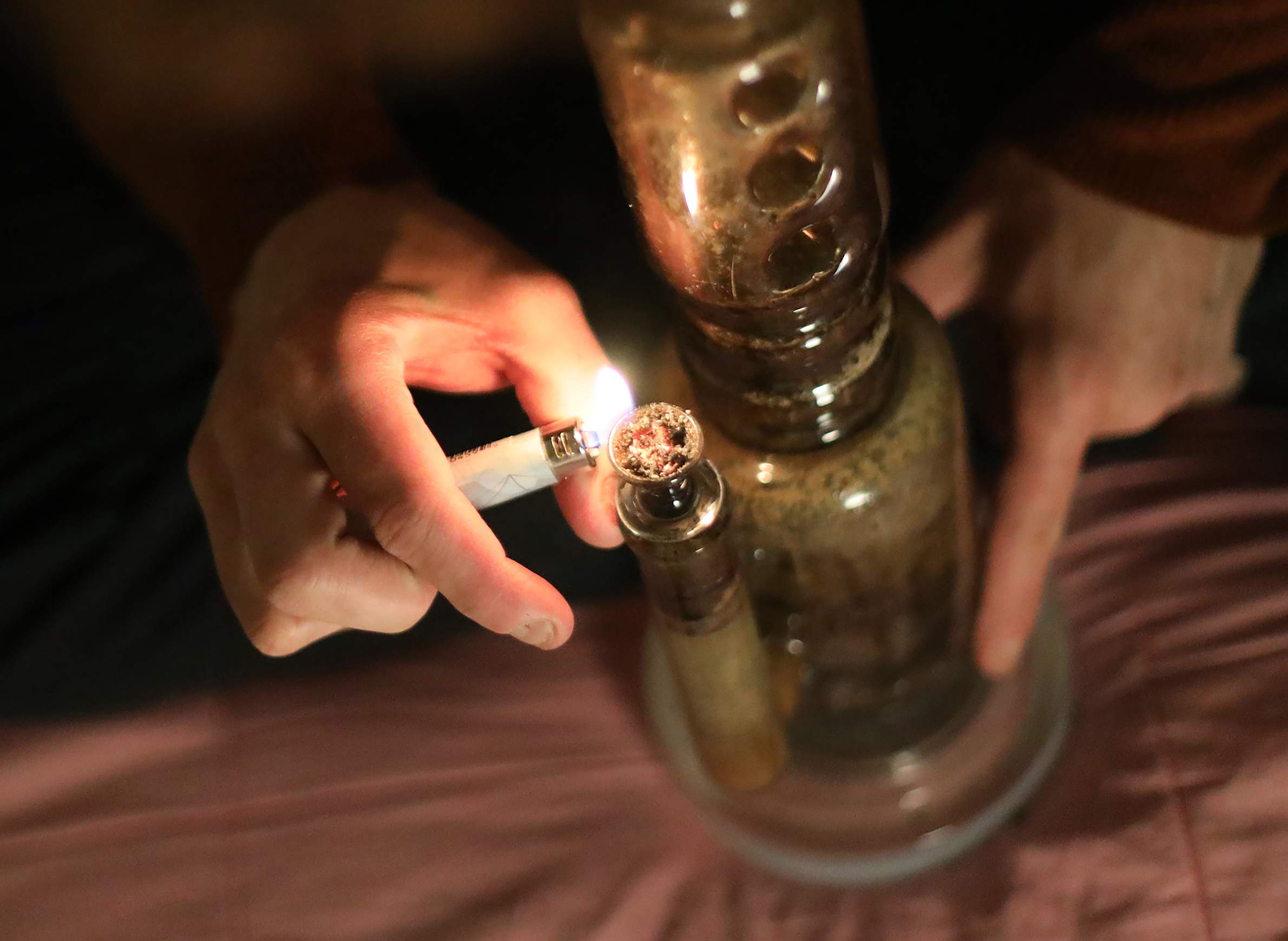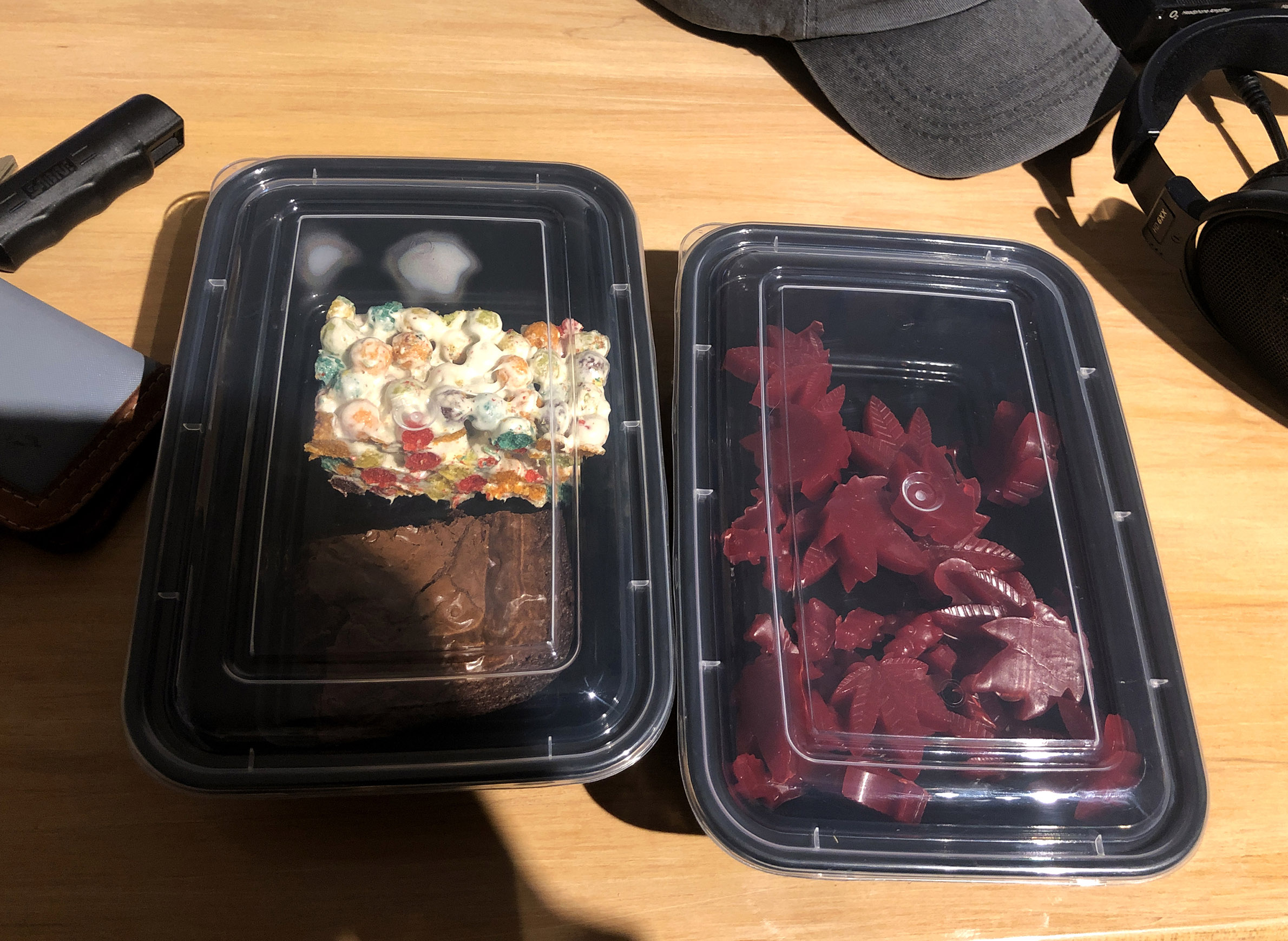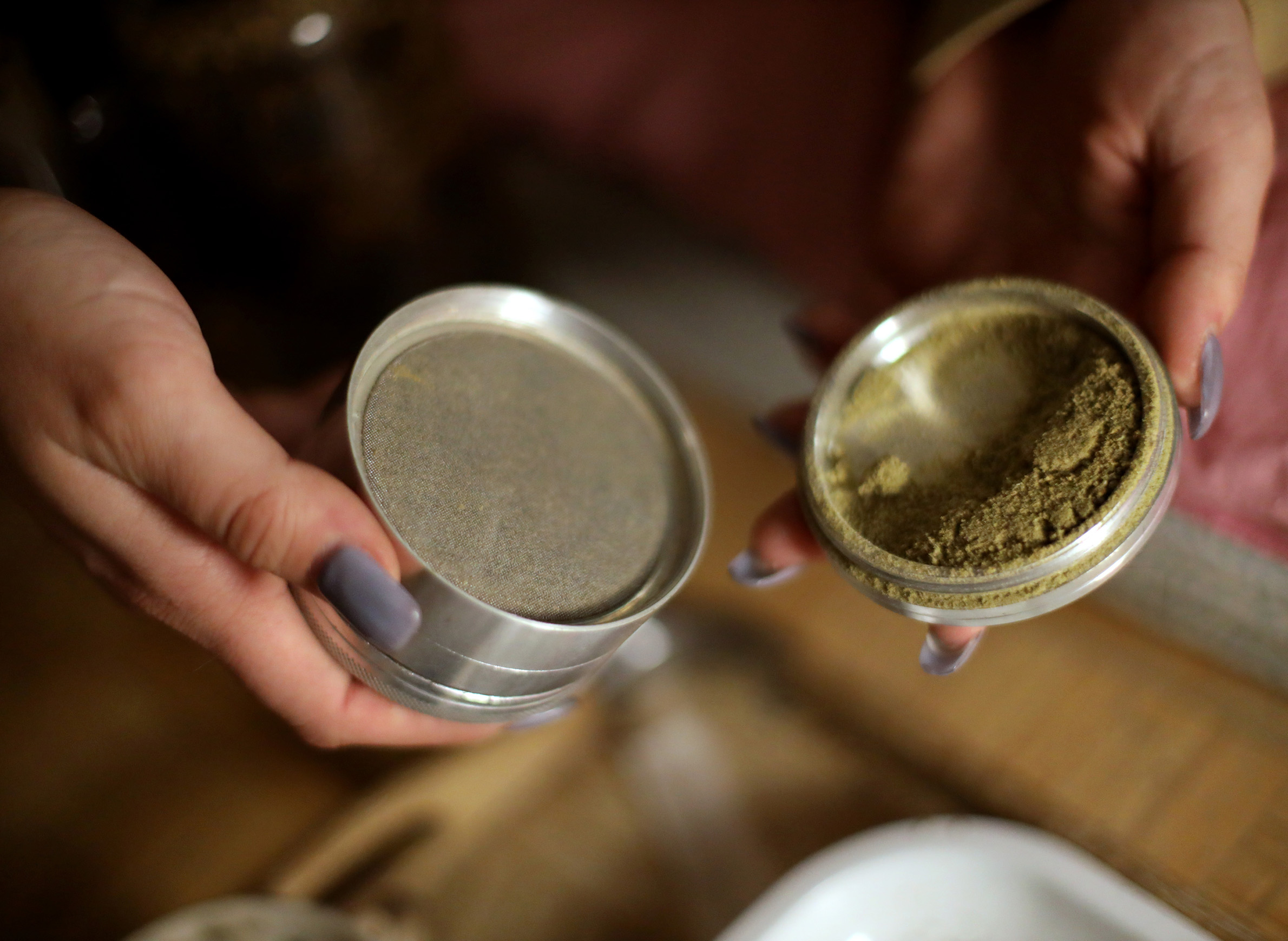
Doctors Underscore Cannabis Risks For Some Users As Legalization Expands

As Wisconsin and other states eye possible legalization of marijuana for medical or recreational use, many effects of using cannabis are still not fully understood. But one thing is certain: Scientists advise against use by young people over concerns of negatively impacting their brain development.
"Children and adolescents are really the place we have to look the most," said Dr. Angela Janis, director of psychiatry for the University of Wisconsin-Madison's University Health Services.
Until people reach their mid-20s, their brains are still developing. Janis warns that adolescents who use heavily may face reduced attention spans, memory and concentration — and increased chance of dependence.
Janis should know: Not only is she a psychiatrist, but she is also the medical director for the Minnesota-based medicinal cannabis firm, LeafLine Labs.
The U.S. Surgeon General earlier this year specifically warned young people and pregnant women against using cannabis.
A bipartisan group of lawmakers has proposed legalizing it for medical use in Wisconsin.
The harm of marijuana use among adolescents and young adults is one reason Smart Approaches to Marijuana opposes legalization, said Colton Grace, a spokesperson for the group, which supports a "health-first approach to marijuana policy." States including Colorado where recreational marijuana is legal, have begun grappling with the problem of young people consuming ever more-potent cannabis in edible and other forms.
Yet, research finds that youth marijuana use "may actually decline after legalization for recreational purposes," according to a study published in September 2019 in the Journal of the American Medical Association Pediatrics. Researchers from universities in California, Colorado, Montana and Oregon based the findings on 1.4 million responses to youth behavior surveys in 34 states.
The result, they wrote, "is consistent with [earlier] findings and with the argument that it is more difficult for teenagers to obtain marijuana as drug dealers are replaced by licensed dispensaries that require proof of age."
In his opposition to full legalization, Grace also points to research that early cannabis use can cause irreversible damage to one's IQ. And an analysis of several studies has raised concerns about a linkage between cannabis use and mental illness.
A book released in January by former New York Times journalist Alex Berenson, Tell Your Children: The Truth about Marijuana, Mental Illness, and Violence, links cannabis use to schizophrenia and violence — "a connection that cannabis advocates are desperate to hide."
The National Academies of Sciences, Engineering and Medicine's 2017 report cited in the book found that "cannabis use is likely to increase the risk of developing schizophrenia, other psychoses, and social anxiety disorders, and to a lesser extent depression."
Ziva Cooper, a member of the committee that wrote the report, wrote in a series of tweets that the committee "did NOT conclude that cannabis causes schizophrenia." Instead, the committee only found "an #association between cannabis use and schizophrenia."
'Borderline psychotic'
Lena Stojiljkovic, a 21-year-old UW-Madison music education student, knows first-hand the risk of consuming cannabis. In the fall of 2016, she was hospitalized for a psychotic break and diagnosed with bipolar I disorder. She said her doctors pointed towards her cannabis use.
She began smoking cannabis habitually in her senior year of high school. One week she used marijuana three times and became delusional.
"I thought my friend was communicating to me in different ways that weren't normal and I would try convincing my mom she wasn't awake, that she was sleeping," Stojiljkovic said. "I didn't think it was out of the norm, though. I thought it was just the effect of weed at the time."
However, she started smoking marijuana more frequently when she came to college and realized something much more serious was happening.
"I was smoking weed three, four times a day, every day, so that by the time November came, I was completely delusional," Stojiljkovic said. "I was borderline psychotic, as all the doctors told me."
Stojiljkovic supports legalization because she believes regulation could make cannabis use safer. But she cautions against ignoring the possible risks.
"I think the big point is that people need to understand that it has its benefits, but there's also that whole psychiatric side where it is linked to psychosis. I know that personally because it's happened to me multiple times, and the biggest thing is that people need to understand that that exists, and it's a bigger issue than what we know," she said. "People are being kind of oblivious because they're so intent on having that escape."
Angela Janis acknowledged there is a strong association to psychotic disorders, but the "exact association we do not know." Early use of cannabis, particularly among 14- to 16-year-olds, will double or triple the chance of a psychotic disorder, she said. She especially cautions young heavy users who have relatives with certain mental health problems.
"Family history," Janis said, "is still the number one risk factor of schizophrenia and psychotic disorders."
Vaping, poison calls spike
Ziva Cooper, research director of the University of California-Los Angeles Cannabis Research Initiative, acknowledged there is concern about consuming cannabis through e-cigarettes, known as vaping.
As of Nov. 13, there were 2,172 reports of severe vaping-related lung damage, including 42 deaths, according to the Centers for Disease Control and Prevention. In a call with reporters in October, Cooper said the lung damage of people who had vaped cannabis or tobacco appears related to the additives in the vaping cartridges, which the CDC says generally were obtained off the street, or from other informal sources. Earlier this month, the agency said it had found the additive, vitamin E acetate, in lung fluid samples from victims.
But there are some verified negative effects of marijuana use. According to a 2018 report by the Colorado Division of Criminal Justice, there were 575 marijuana-related hospitalizations per 100,000 hospitalizations in 2000 before the state legalized medical marijuana. The rate jumped to 2,696 marijuana-related hospitalizations per 100,000 in 2014-15 after the state legalized recreational marijuana.
The CDC notes the dangers of excessive use of cannabis, which can include anxiety, paranoia, hallucinations and vomiting
Colorado and New York also have seen a rise in a new possible side effect of using cannabis. Patients will usually arrive at the emergency room with severe abdominal pain, intense vomiting and dehydration — the typical symptoms of cannabinoid hyperemesis syndrome, or CHS.
Colorado ERs saw a nearly doubled prevalence in CHS cases after medical marijuana laws were loosened in 2009.
Doctors began to see patients with the rare syndrome almost daily, according to Dr. Kennon Heard, a professor of emergency medicine at the University of Colorado School of Medicine.
"It's a relatively uncommon condition, but we don't really know the prevalence of it," Heard said. "The frequency with which we have seen it in our emergency department, I can tell you we essentially never saw it in our emergency department until we had medical marijuana legalized."
CHS is most likely to present itself in people who have used cannabis daily for months or years. Symptoms can be intense for a few days, disappear, and then return days after.
"Generally there's not a lot to do for it other than just rehydrate patients and try to get them medications to help with their nausea and vomiting," Heard said. "Treatment for it is really to stop using it [cannabis] if it’s getting that bad. The problem is when people stop, it often takes several days for their symptoms to abate."
Some patients have found relief taking hot showers. One theory, Heard explains, is that the nerves that heat the body are related to the body's cannabinoids. The hot water stimulates the same nerves that cannabis affects.
Of the few studies, one looked into the number of CHS cases in a public hospital in New York and found almost 33 percent of frequent cannabis patients in the ER had CHS symptoms in the past. Experts are still trying to learn how to best take care of patients with CHS.
A large number of cannabis-related hospital visits are also due to marijuana "edibles." A study published in April 2019 that analyzes ERs in Denver found that nearly 10 percent of cannabis-related visits included edible cannabis.
A gateway or alternative drug?
One of the issues in the legalization debate centers around whether using cannabis will lead to the use of "harder" drugs. Dr. David Nathan, the founder of pro-cannabis Doctors for Cannabis Regulation, does not believe there is "such a thing as a gateway drug."
And the debate about whether marijuana is a gateway drug is not over.
The National Institute on Drug Abuse's research report on cannabis indicates "that marijuana use is likely to precede use of other licit and illicit substances," but the majority of people using cannabis "do not go on to use other, 'harder' substances."
Colton Grace points out that users can become addicted to cannabis itself.
"Marijuana is an addictive substance that can produce withdrawal and dependence, and the studies that show that are based on very low potency THC marijuana that is not representative of the higher potency stuff you're seeing on the market today," Grace said. "So we don't really know what, if any, ill effects the marijuana sold on the market today could be having on people."
The CDC said people addicted to marijuana are three times more likely to become addicted to heroin. However, other drugs carry much higher risks, with cocaine addicts 15 times more likely and prescription opioid addicts 40 times more likely to become addicted to heroin.
Some research shows that cannabis may actually be an alternative drug for pain that can alleviate the opioid crisis and reduce use of prescription drugs. One advantage of marijuana is it does not suppress the respiratory system so it is not associated with fatal overdoses.
Some studies show a correlation between medical cannabis legalization and reduced prescription drug abuse. A 2014 study published in the Journal of the American Medical Association found that the presence of medical marijuana laws was "associated with significantly lower state-level opioid overdose mortality."
The journal also has published studies showing that states with medical cannabis laws have fewer Medicare Part D prescriptions for pain medicine and fewer opioids prescribed overall.
Other studies point in the opposite direction. "Cannabis use appears to increase rather than decrease the risk of developing nonmedical prescription opioid use and opioid use disorder," according to the 2017 study published in The American Journal of Psychiatry.
And a study published in June 2019 in the Proceedings of the National Academy of Sciences of the United States found no connection between the legalization of marijuana and opioid overdose deaths.
For Pewaukee resident Cari, who suffers from rheumatoid arthritis, fibromyalgia and chronic disc disease, taking cannabis has allowed her to stop using gabapentin, a popular pain medication that is being seen more frequently in drug overdoses.
While the prescription drug is not an opiate or considered addictive, gabapentin can increase the effects of other drugs. Taking it with opiates such as fentanyl or heroin can cause a more dangerous high.
Cari was taking 600 milligrams of the medication every day for pain before she switched to cannabis. She asked that her last name not be used because cannabis use is illegal in Wisconsin.
"It just makes my quality of life better. I have minimal pain now," Cari said. "I'm just more functional. Being able to do more things and not have to live in that constant state of pain, which can be kind of debilitating."
Nathan believes there is not proper research so far to determine whether cannabis really is a replacement for opioids — or whether it is too harmful to offer to patients.
"We may not be so certain on the information affirmatively suggesting its use, but we do have a lot of info on the potential harms of cannabis, which are not so great as to preclude us from, at least, offering it as an option to patients as an alternative to potentially more dangerous drugs," Nathan said.
Driving while drugged
Impaired driving is one of the major public health concerns of legalizing cannabis, yet remains one of the most difficult to measure. Cannabis use does double the chance of getting into a crash, but, Angela Janis said, it does not impact a person's ability to drive nearly as much as alcohol.
"There is no good test to assess objectively whether somebody who has recently consumed cannabis is impaired because of that," David Nathan said. "There's no good correlation between the measure and level of impairment."
Some drivers suspected of having consumed cannabis may take a blood test to detect whether it is in their system. However, cannabis consumed up to 28 days earlier will still be detected — even long after the intoxicating effects have worn off.
Some people mistakenly believe cannabis causes no driving impairment. In a 2017 survey, one-third of the students surveyed believed it was legal to drive under the influence of marijuana. Even 27% of parents believed it was legal. The survey was conducted by Liberty Mutual Insurance and Students Against Destructive Decisions, which seeks to help young people "make positive decisions that advance their health and safety."
Traffic fatality rates in Colorado and Washington state pre- and post-legalization were not statistically different from comparable states, according to a 2017 study published in the American Journal of Public Health.
Data on car crashes in Colorado after legalization showed that the number of fatal crashes involving people who had cannabinoids in their bloodstream did increase. But the authors of that 2018 study warned against any historical comparison of crash rates because the state has heightened drug testing since legalization.
"We don't know what that [increase] means," Janis said. "Does that mean more people in Colorado are using and they happen to have it in their system, or are more people with active, intoxicated THC being involved in the accidents?"
Reporter Francisco Velazquez and Wisconsin Watch managing editor Dee J. Hall contributed to this story, which was produced as part of an investigative reporting class at the University of Wisconsin-Madison School of Journalism and Mass Communication under the direction of Hall. The Cannabis Question is a series exploring questions about proposals to legalize marijuana in Wisconsin. Wisconsin Watch's collaborations with journalism students are funded in part by the Ira and Ineva Reilly Baldwin Wisconsin Idea Endowment at UW-Madison. The nonprofit Wisconsin Watch collaborates with Wisconsin Public Radio, Wisconsin Public Television and other news media. All works created, published, posted or disseminated by Wisconsin Watch do not necessarily reflect the views or opinions of UW-Madison or any of its affiliates.
This report is the copyright © of its original publisher. It is reproduced with permission by WisContext, a service of PBS Wisconsin and Wisconsin Public Radio.











